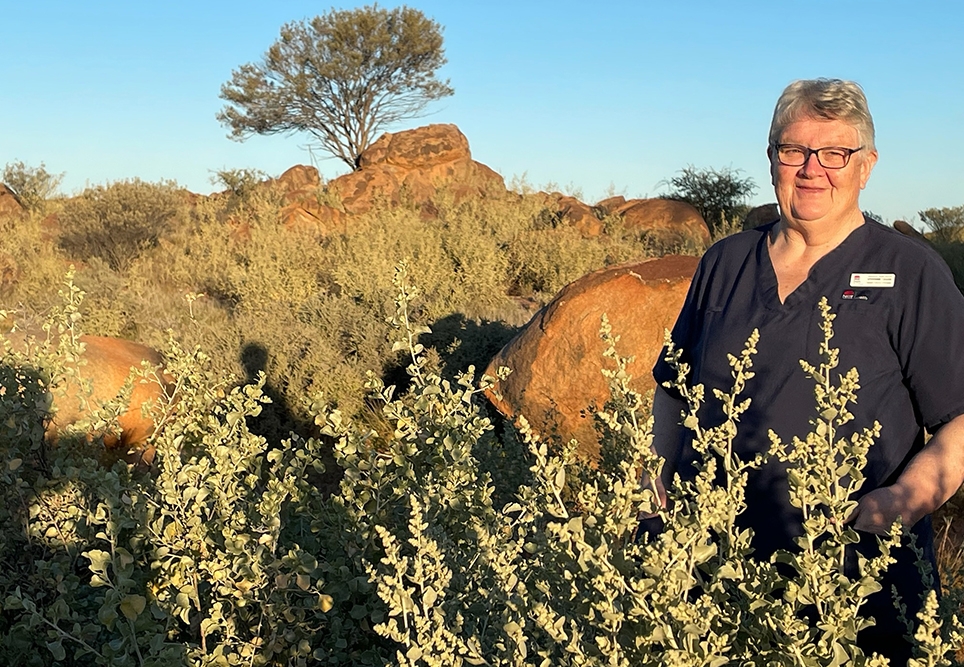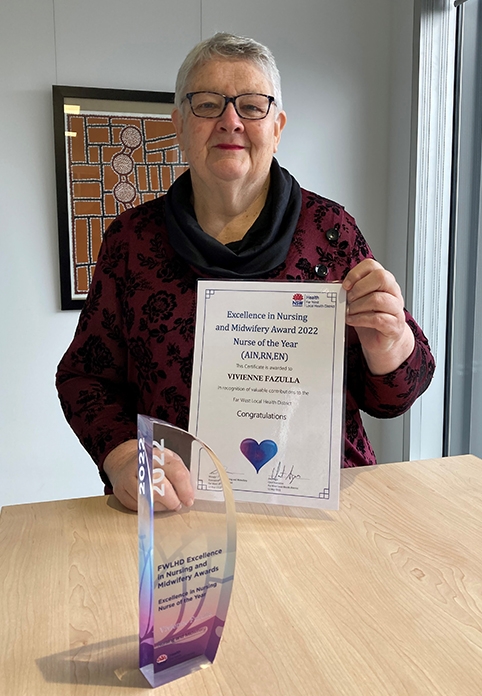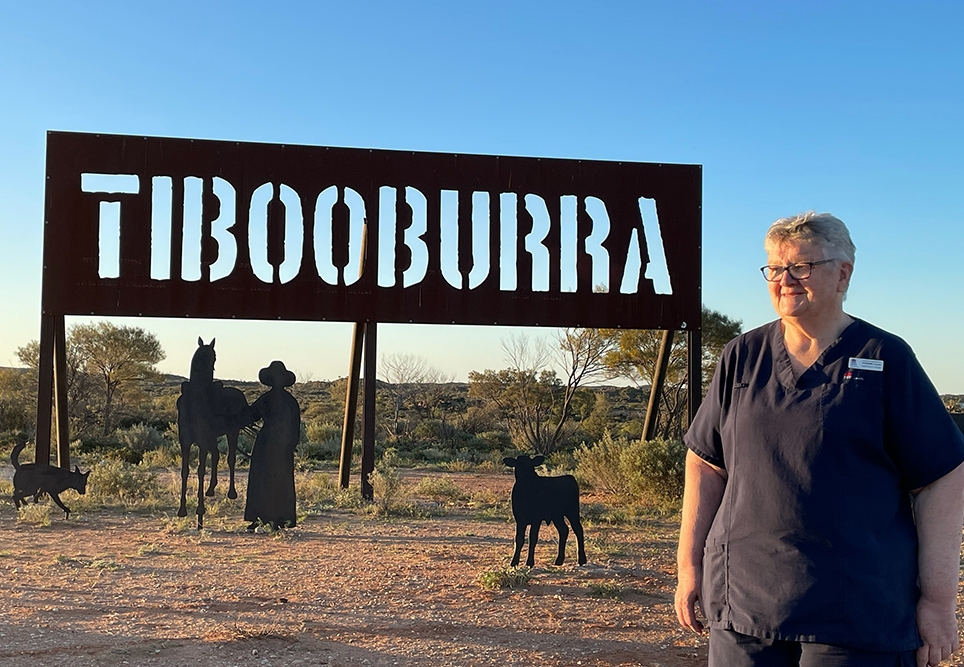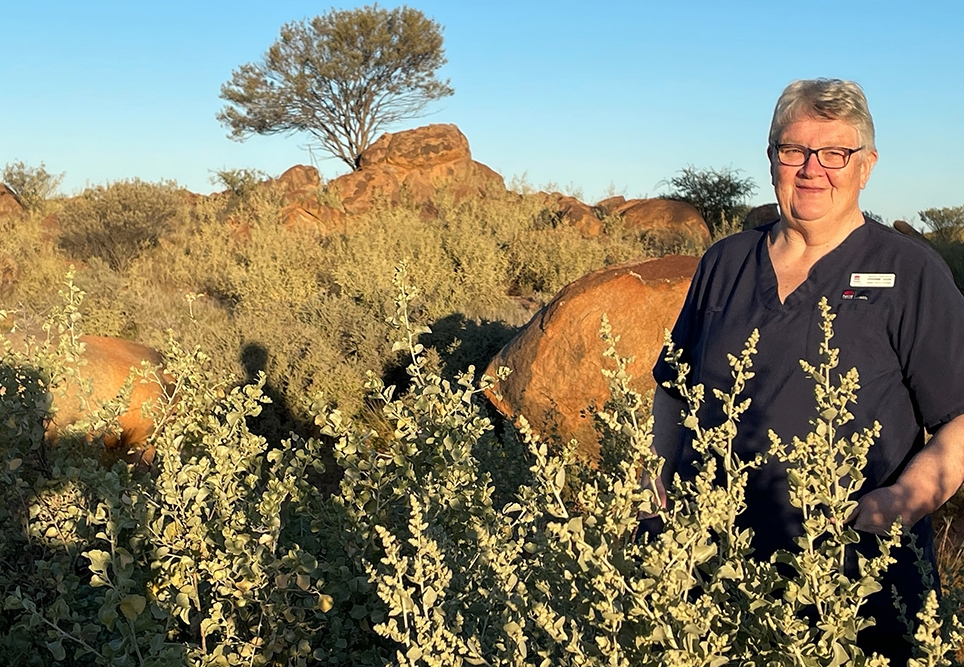In 2014, Viv retired from her job at the Dingee Bush Nursing Centre in Victoria after 36 years of service.
“I lasted six months,” she says. “My husband Azzie and I were back in Tibooburra and there was a job going, so I applied and got it in December 2014.”
They’d met in 1976 in Tibooburra, a town 350 kilometres north of Broken Hill, just south of the NSW/Queensland border. Viv was nursing and Azzie working as a station hand.
His father had migrated from Punjab and established himself as one of Australia’s pioneering Afghan cameleers in Broken Hill during the late 1800s.
The couple’s return was like a homecoming.
“Everybody knew us,” Viv said. “I didn’t have to prove myself… I practically knew everybody here, even if we were all a little shorter, older, balder, and grey-haired. Everybody embraced us.”
Azzie passed away in 2018 but Viv has stayed on in Tibooburra.
“The red dirt’s under my skin. I don’t think I could go anywhere else.”

Far West LHD’s Nurse of the Year
Around three or four first-year graduates under-take placement at Tibooburra annually. Viv isn’t sure which of them nominated her for the NSW Far West Local Health District Award for Nurse of the Year, which she received in May 2022.
“In your nursing career, if you’ve helped someone – even one person – overcome adversity, you’ve succeeded, and can accept a pat on the back,” Viv says.
“I think I’ve done that and made a difference to people’s lives.”
She’s most proud of “the fact I’ve lasted this long… Honest, I’ve never woken up and thought I don’t want to go to work today. It’s always been a privilege.”
Rather than focus on herself, Viv is eager to discuss the future of the remote nursing profession.
“It’s a real honour to be able to pass onto [the grads] how to live out in a remote area, how to survive,” she says.
“They come out here, all alone… They don’t have to reinvent themselves, but they do have to think about who they are and where they are.

“I just hope they remember – and obviously some of them do – and when I am in a [nursing] home they’ll remember me and bring me chocolate!”
The award can also be seen as an acknowledgment of commitment of the Fazulla family to health care in the Far West Local Health District, which is built around Broken Hill Base Hospital.
Azzie’s great nephew’s wife, Avril Fazulla, herself took out the New to Practice Nurse/Midwife of the Year Award in 2022.
“The Shamroses and Browns and Burns at the [Broken Hill] hospital – many relate back to the Fazullas,” Viv says.
“I think there’s probably about 20 people at the hospital that come from Azzie’s family.”
Knowns and unknowns in primary health care
“It’s a hard life out here, for the people on the stations, and you can see the difference you make,” Viv says. “You can see the initial wound and work your way right through the dressing and recovery. You can see how what you do initially impacts on the outcome.
“My ethos is, you get three options if you come to me for advice or assistance,” Viv says.
“You do as I say – in consultation with you; you take on board and go away and think about it; or you decline my offer – but knowing full well you can come back again, and we’ll restart the process. I never say no.
“I try to assist you to take ownership of your own health outcomes, whether for yourself or family or friends.”
Viv has mastered these enduring principles, but she has also had to adapt to others that have evolved over time. It’s easier now to transfer ECG results to Broken Hill, to obtain blood results locally with i-STAT, and to be guided by doctors watching through a camera in the ED ceiling during emergencies.
She no longer needs to book in a time to call to her out-of-town relatives (in 1976, her time used to be two o’clock on Sundays).
“I remember when I first started my training, you weren’t even allowed to touch a stethoscope unless a doctor dropped it on the floor,” Viv says. “Now there are processes, through education and support, I can [follow] in emergencies. It’s amazing.
“I’m not a midwife and in the last couple of years I’d had a couple of ladies go into early labour. That’s been heart-wrenching for me, not the mother! But I just calmed myself down… I have done work through CRANA education programs for what to do in emergencies. I’m quite happy with that.”
Nurses have been empowered by technology, but Viv also believes a nurse’s intuition continues to play a vital role in modern care.
“You’ve got to be aware of yourself and your own gut feeling,” she says. “That sense of ‘there’s something not right here’ – you’ve always got to believe in it.
Thank you, Tibooburra!
“I thank my family for putting up with my career path,” Viv says in conclusion. “Without their support, I wouldn’t be here having fun in the desert.
“Thanks also to NSW Health and the Far West LHD for their support, my co-workers here at Tibooburra, and the Tibooburra community. I’m really blessed by our supportive community.
“Remote Area Nursing is the best job! And by the way, my position is not available to anyone else for some time yet.”

Life and work in Tibooburra
During our conversation in May, Tibooburra had already exceeded its average annual rainfall. The lush saltbush and scrub add a splash of green to the red dirt and big blue skies – “the magic stuff that keeps you living out here,” Viv calls it.
The road from Broken Hill to Tibooburra has recently been sealed. Any flooding of the creeks is now less likely to wash away the road or turn it to mud, making it easier for health services and tourists to access Tibooburra.
“One day we had a guy come into the health service, badly injured,”
Viv recalls. “The majority of our ED presentations are motorbike riders.
“My question was – what are you riding? He told me. Oh yeah, I said, you shouldn’t ride that model out here! Oh, and what do you do? I asked.
“I’m a dealer for these motorbikes, he said. I own a dealership.
“I asked: what have you learned in the last couple of hours?
“Lots, he said. There’ll be a letter going back to head office!”
Whether by bike, plane or car, there’s ample incentive to head to Tibooburra, for the love of the desert, hope of encountering native flora and fauna (including reintroduced bilbies), or to explore the new Sturt’s Steps Museum which documents Afghan Cameleer history.

